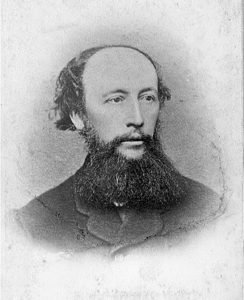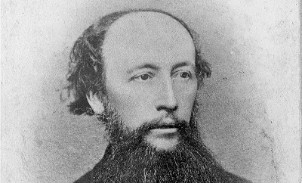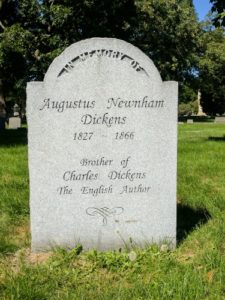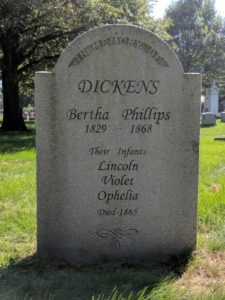By Tom Carmichael, Class of 2007

Charles Dickens never came to Chicago. However, one of his immediate family members is a permanent resident. Charles Dickens’ youngest brother, Augustus, is buried in Graceland Cemetery. How did he literally end up in Chicago?
Charles must have regarded his brother with affection in his early years. Charles’ first collection of stories – Sketches by Boz (1836) – was named for Augustus whose childhood nickname was Moses. His older brothers irritatingly pronounced “Moses” through their noses, making the name sound like “Boses,” which over time was shortened to Boz. By 1845, when Augustus was 17, Charles wrote to a prospective employer that August had been educated in a “good school at Exeter” and was “quick and clever; has never given trouble to anybody: and has been well brought up.”
In his early years, Augustus made his way in London, finding work, joining the London Freemasons, and appearing in amateur plays sponsored by his famous brother. When he was 27, Augustus married Harriett Lovell, the daughter of a prosperous London family. Only seven years later he left her to travel to America. Unfortunately, Harriett had gone blind. Some say Augustus left his wife because she was blind. There is, though, strong evidence that he had fallen in love with another woman. Augustus left London in early 1855. Travelling with him to America was Bertha Phillips, the 27-year old daughter of an English solicitor.
Upon their arrival in the U.S., Augustus and Bertha moved to Amboy, Illinois, about 100 miles west of Chicago, near Dixon. They lived together as a married couple and had three children although Augustus never formally divorced Harriett. Augustus found employment as a newspaper editor, then opened a retail store in Amboy, and eventually moved to Chicago where he worked as a clerk for the Illinois Central Railroad.
According to contemporary reports, Augustus was a charming man, good storyteller, and well liked. But, he was also a heavy drinker, spent too much on liquor and fell on hard times. He died at the age of 38 of tuberculosis, leaving Bertha more or less destitute. Their children – a boy and two girls – had all died during 1865, a year before their father’s death. In a turn worthy of a Dickens’ novel, Bertha committed suicide on Christmas Eve of 1868. She took an overdose of morphine, probably in the form of laudanum.
Augustus and his family were buried in unmarked graves just north of the Graceland entrance near the Clark Street wall, well away from the prominent Chicagoans featured on the original Graceland tour. In 2004 the Chicago branch of the Charles Dickens Fellowship, with other supporters, placed a marker at the gravesite. The marker is in a style popular in the 19th century – a slim, upright slab of stone.
Although he toured the United States twice, Charles Dickens never came to Chicago. The first time was in 1842, before his brother moved to Illinois and when Chicago was just getting started. Dickens’ second tour of the U.S. was after the Civil War in 1867 – 1868. Dickens was scheduled to come to Chicago and St. Louis during this second reading tour. His brother Augustus was already dead and buried in Graceland. Charles’ health was in rapid decline. He cut short the tour and never ventured beyond the northeastern states. He returned to London in poor health and died two years later in 1870 at the age of 58. The famous Dickens is buried in the Poets Corner of Westminster Abbey.
To see the gravesite of the less famous Dickens, visit Graceland. CAC offers three tours of the cemetery: (1) the original Graceland tour that focuses on prominent Chicagoans and famous architects, (2) Women of Influence that focuses on the contribution of eminent women to Chicago’s development, and (3) Symbols in Stone that highlights unusual markers of noteworthy men and women.
[Note: Pictures of the front and back of the Dickens marker are attached to the email.]




Interesting tidbit of history of the Dickens family and its relationship to Chicago. Thanks, Tom
thanks for sharing this, Tom